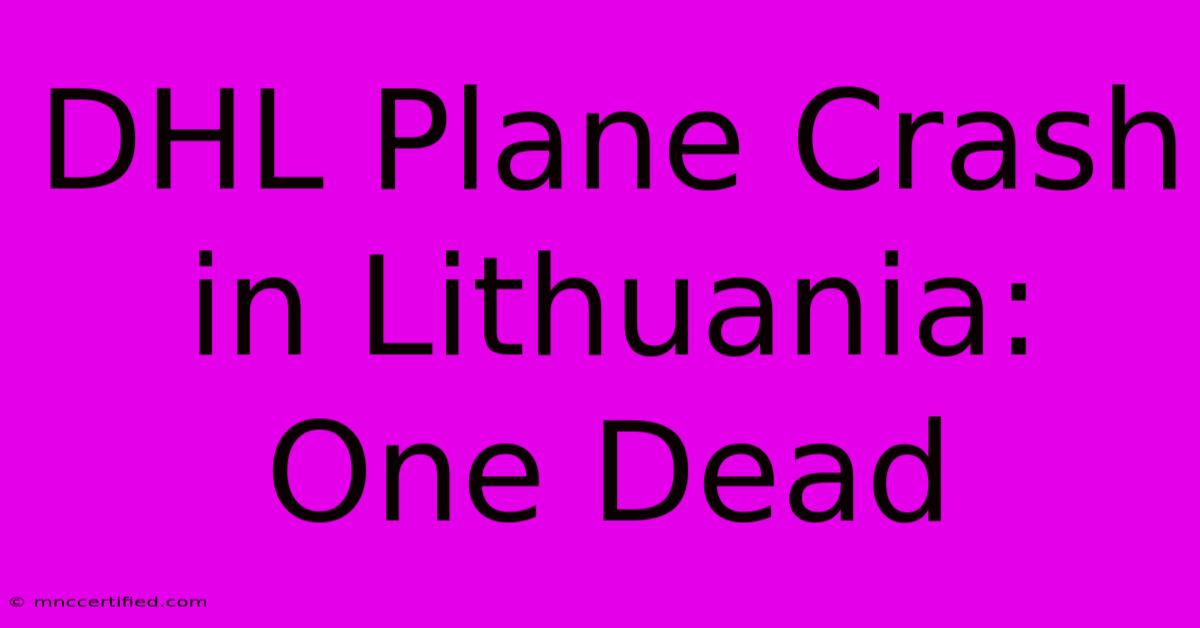DHL Plane Crash In Lithuania: One Dead

Table of Contents
DHL Plane Crash in Lithuania: One Dead – A Tragic Accident and its Aftermath
A tragic DHL plane crash in Lithuania claimed the life of one person, prompting a comprehensive investigation and raising serious questions about aviation safety. This incident serves as a stark reminder of the inherent risks in air travel and the importance of rigorous safety protocols. This article delves into the details surrounding the crash, its impact, and the ongoing efforts to understand its cause.
The Details of the DHL Plane Crash
On [Insert Date of Crash], a DHL cargo plane, a [Insert Plane Model], crashed near [Insert Location in Lithuania] resulting in the unfortunate death of [Insert Details about the victim, if available, respecting privacy]. While initial reports suggested [Insert Initial Reports about the cause – e.g., engine failure, bad weather], the exact cause of the crash remains under investigation by Lithuanian authorities, aided by international aviation experts from DHL and the aircraft manufacturer.
The Investigation: Unraveling the Cause
The investigation is a meticulous process, requiring the examination of the wreckage, flight data recorders (black boxes), and witness testimonies. Experts will meticulously analyze every aspect of the flight, from pre-flight checks and weather conditions to the pilot's actions and potential mechanical failures. This process can take considerable time, often extending over several months or even years depending on the complexity of the accident. Transparency and regular updates to the public are crucial during this period to maintain trust and prevent speculation.
Impact and Aftermath
The crash had a significant impact beyond the immediate loss of life. It disrupted cargo operations, potentially causing delays and affecting businesses reliant on DHL's services. The accident also raised concerns about the safety of air freight and the measures in place to prevent similar tragedies. The economic impact on Lithuania, particularly on the local airport and surrounding businesses, is also a significant factor requiring careful assessment.
The Role of Aviation Safety Regulations
This tragedy underscores the critical role of stringent safety regulations and their consistent enforcement within the aviation industry. Regular inspections, pilot training, and maintenance protocols are fundamental in mitigating risks. International collaboration in aviation safety investigations is equally important, allowing for the sharing of best practices and the identification of systemic issues that may contribute to accidents. Learning from past incidents and implementing necessary improvements is paramount to ensuring the ongoing safety of air travel.
Looking Ahead: Lessons Learned and Future Prevention
The investigation's findings will be crucial in determining the contributing factors to the DHL plane crash and identifying any necessary improvements in safety procedures. This knowledge is not just vital for DHL but for the entire aviation industry. Regulatory bodies and aircraft manufacturers will likely scrutinize the findings, using them to update safety guidelines and prevent future accidents.
The Importance of Transparency and Communication
Open communication with the public throughout the investigation is vital. Providing regular, factual updates without sensationalizing the event is crucial in maintaining public trust and fostering a better understanding of the complexities involved in accident investigations. This transparency helps build confidence in the process and ensures that lessons learned contribute to improving overall aviation safety.
Keywords: DHL plane crash, Lithuania, aviation accident, cargo plane crash, investigation, aviation safety, flight safety, air freight, accident investigation, black box, DHL, [Insert Plane Model], [Insert Location in Lithuania], [Victim's Name - if publicly available and appropriate].
(Note: Remember to replace the bracketed information with accurate details once they become available from official sources. Always cite your sources to maintain credibility and avoid misinformation.)

Thank you for visiting our website wich cover about DHL Plane Crash In Lithuania: One Dead. We hope the information provided has been useful to you. Feel free to contact us if you have any questions or need further assistance. See you next time and dont miss to bookmark.
Featured Posts
-
Menendez Case Joint Hearing After Decades
Nov 26, 2024
-
January Hearing For Menendez Brothers
Nov 26, 2024
-
Global Microsoft Outage Updates
Nov 26, 2024
-
Patsy Ramseys Death Jon Benets Mother
Nov 26, 2024
-
What Is A Life Insurance Broker
Nov 26, 2024